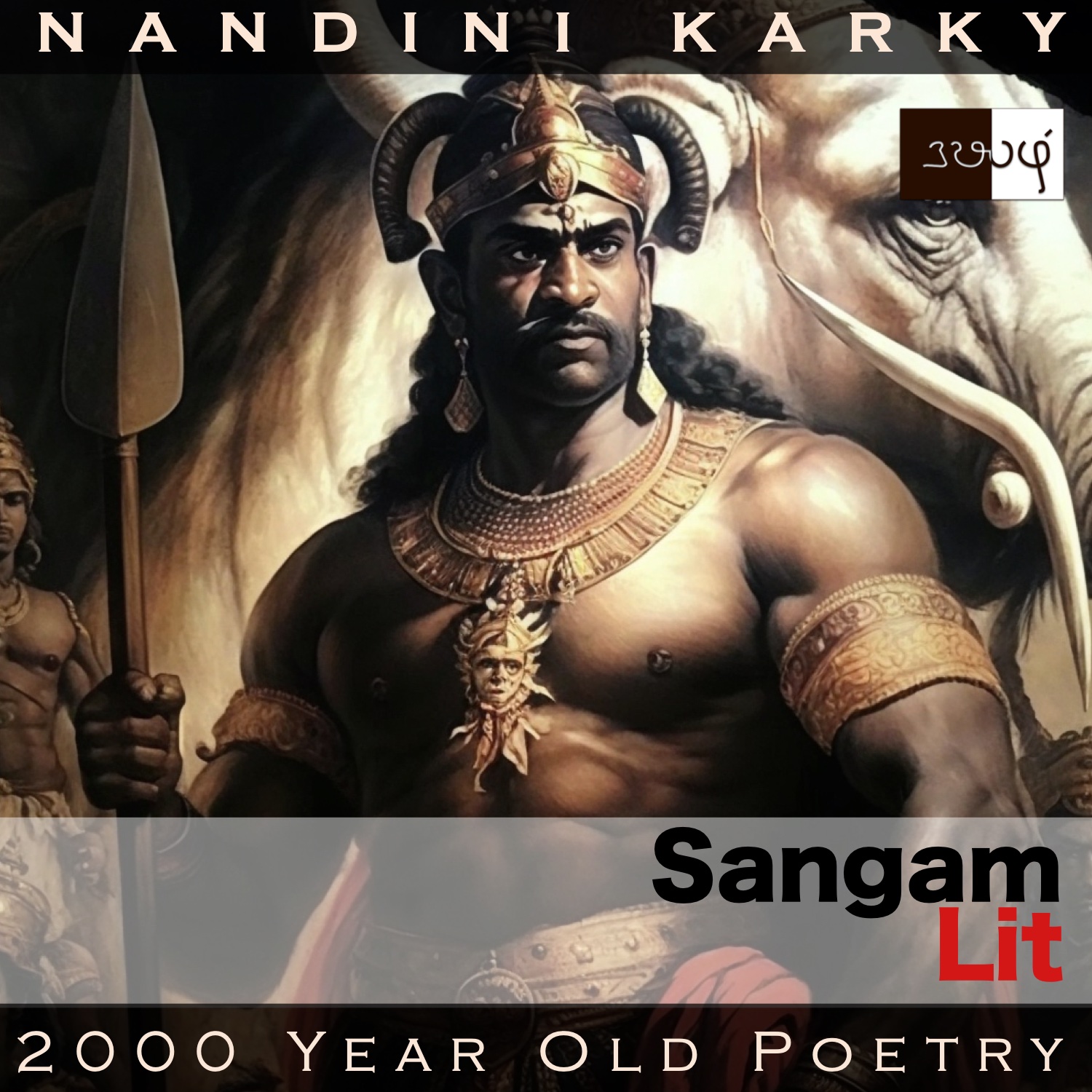Podcast: Play in new window | Download
Subscribe: Apple Podcasts | Spotify | Amazon Music | Android | iHeartRadio | TuneIn | RSS | More
In this episode, we perceive the mindset of enemy kings, as depicted in Sangam Literary work, Puranaanooru 98, penned about the Velir king Athiyamaan Nedumaan Anji by the poet Avvaiyaar. The verse is situated in the category of ‘Vaagai Thinai’ or ‘King’s victory’ and narrates the consequences of the king’s decision to battle.

முனைத் தெவ்வர் முரண் அவியப்
பொரக் குறுகிய நுதி மருப்பின் நின்
இனக் களிறு செலக் கண்டவர்
மதில் கதவம் எழுச் செல்லவும்,
பிணன் அழுங்கக் களன் உழக்கிச்
செலவு அசைஇய மறுக் குளம்பின் நின்
இன நல் மாச் செலக் கண்டவர்
கவை முள்ளின் புழை அடைப்பவும்,
மார்புறச் சேர்ந்து ஒல்காத்
தோல் செறிப்பு இல் நின் வேல் கண்டவர்
தோல் கழியொடு பிடி செறிப்பவும்,
வாள் வாய்த்த வடுப் பரந்த நின்
மற மைந்தர் மைந்து கண்டவர்
புண் படு குருதி அம்பு ஒடுக்கவும்,
நீயே, ஐயவி புகைப்பவும் தாங்காது, ஒய்யென,
உறுமுறை மரபின் புறம் நின்று உய்க்கும்
கூற்றத்து அனையை; ஆகலின், போற்றார்
இரங்க விளிவதுகொல்லோ வரம்பு அணைந்து
இறங்குகதிர் அலம்வரு கழனி,
பெரும் புனல் படப்பை, அவர் அகன் தலை நாடே!
Another long song with a similar thought flow as the previous verse. The poet’s words can be translated as follows:
“Those who see your herd of elephants, with tusks blunted and shortened in quenching the conflict of enemies at the battlefield, raise new doors and bolts at their forts;
Those who see your herd of fine horses, with hooves stained because of their rushing around the battlefield as they press the bodies of the dead deep down, shut their small entrances with thorny bushes;
Those who see how your spear never stays in its case and ceaselessly pierces the chest of enemy soldiers, strengthen the handles on their shield shafts;
Those who see the infinite strength of your valorous warriors, who have scars of swords all over, stuff their blood-stained arrows back into the quiver;
As for you, not minding the smoke from mustard, as per the tradition of appearing, akin to Kootruvan, the God of death, you rise then and there and snatch away their lives in an instant; And so, those who do not stand by you, are to be pitied, even though they have limitless, lush fields of curving stalks of crops, whirling amidst the rich river waters flowing in the domain of their vast country!”
Time to explore the nuances. The poet starts by talking about the first thought that rises in the heads of those enemy kings who catch a glimpse of King Athiyamaan’s elephants with their blunted tusks owing to much use against enemy fort walls. And that thought is to build new, strong doors fitted with sturdy bolts. After this, it’s the turn of horses with stained hooves which terrorise enemy kings to shut the small paths and entrances to their forts with thorns. This is followed by the sight of the king’s spear that never seems to rest even for a moment in its killing that they go about tightening the handles on their shields. Next, is a glance of the battle wound ridden soldiers of this king, who make those enemies put away their arrows, perhaps considering the futility of soaring against these indefatigable soldiers!
As the final shot, the poet zooms on to the king, whom she compares to the God of Death – Kootruvan. Herein, she gives an interesting piece of information that echoes an ancient belief of the Sangam people. They seemed to have thought that the smoke from mustard would drive away ghosts and save their warriors from death. Nevertheless, falsifying their hopes, Death does come to their doors and snatch them away, the poet adds. It’s this action that she compares to that of the king, in his ending the lives of his enemies swiftly. Finally, she ends with the thought that no matter how rich and fertile a country they rule, filled with far-extending paddy fields and unceasing supply of river water, those enemy kings were to be pitied indeed, if they had to face the wrath of this king!
The interesting detail we can zoom on to here is the fact about mustard smoke being used to ward off death. While this has been presented as a superstitious belief, science has something else to say. It has been discovered that mustard has the properties of anti-inflammation, pain-relief and preventing microbe growth. So, it’s quite possible that this mustard smoke being blown near soldiers battling for their lives eased their pain and perhaps led them to live longer than they were expected to. With time, maybe this thought came to be understood as a matter of hope rather than a matter of healing. Interesting how a two thousand year old verse helps us reflect on the possible bridge between science and faith!




Share your thoughts...